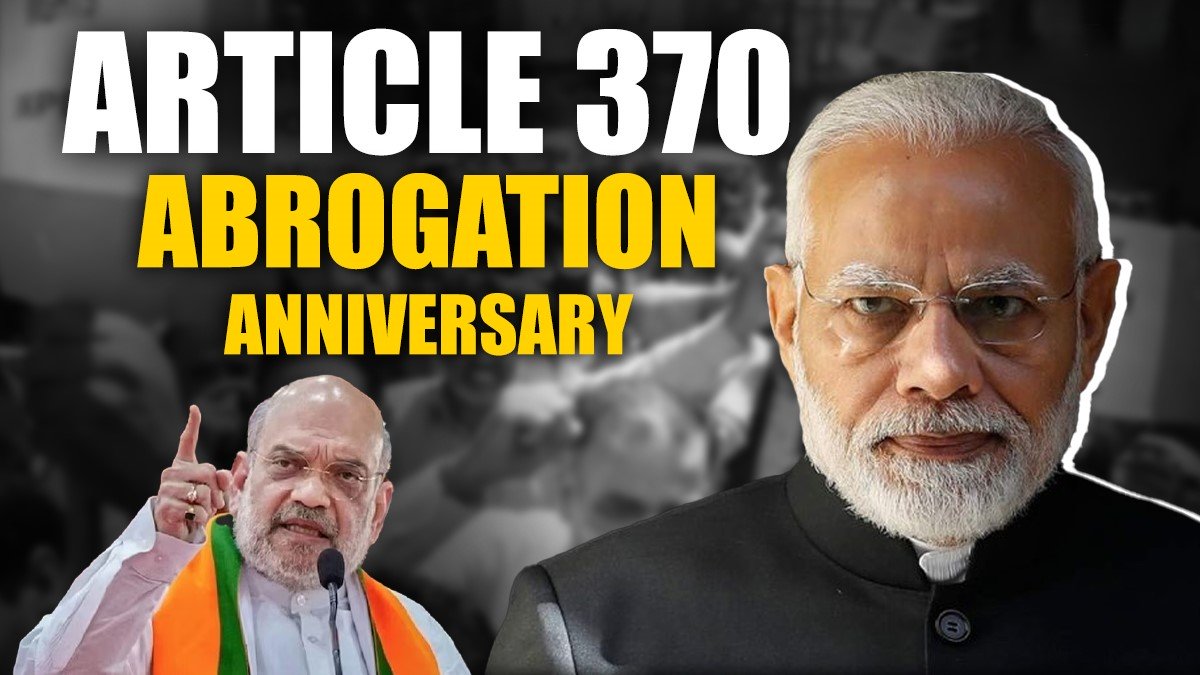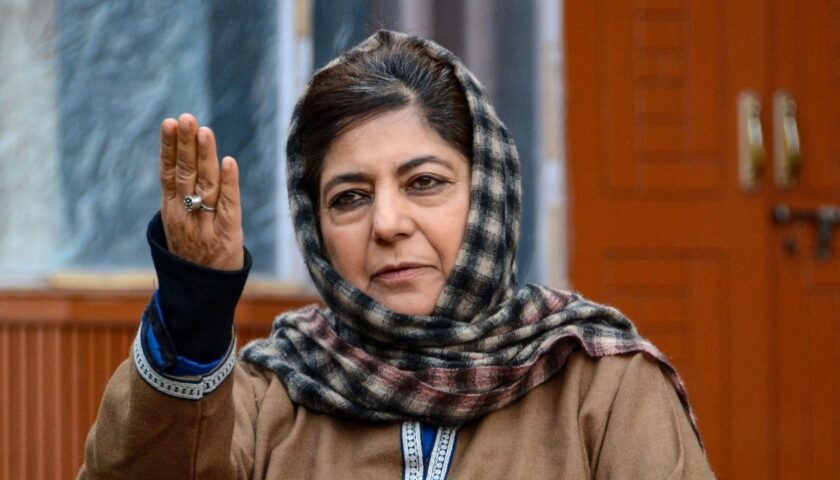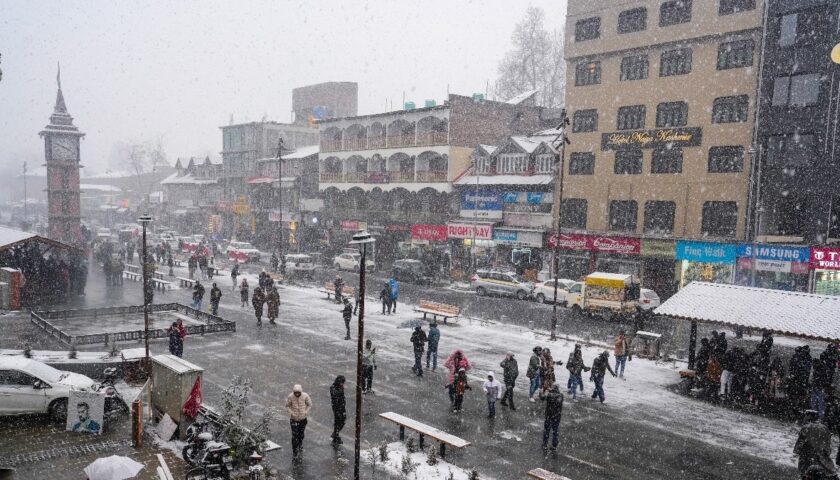Statehood Demand Takes Centre Stage on Article 370 Anniversary in Jammu & Kashmir
By: Javid Amin | Srinagar | August 6, 2025
A Date Etched in Memory — August 5, 2019
August 5 is no longer just another date in Jammu & Kashmir — it is a fault line in the political, emotional, and constitutional landscape of the Union Territory. On this day in 2019, the Government of India revoked Article 370, stripping J&K of its special constitutional status. In the six years since, the region has witnessed unprecedented political upheaval, a reconfiguration of its identity, and an ongoing demand for statehood restoration and constitutional safeguards.
As the sixth anniversary dawned on August 5, 2025, contrasting narratives played out on the streets, screens, and in the hearts of people. While the Bharatiya Janata Party (BJP) marked it as a day of “integration and development,” the People’s Democratic Party (PDP), National Conference (NC), and Congress called it a “Black Day” — a reminder of “betrayal without consent.”
Silent Resistance: Mehbooba Mufti’s Blackout Call Resonates Across Kashmir
In a rare act of peaceful and symbolic protest, PDP president and former J&K Chief Minister Mehbooba Mufti issued a call for a 15-minute blackout at 9 PM. Urging residents to switch off their lights, she framed the gesture as a moment of silent mourning and remembrance for the loss of autonomy.
“Let the silence speak. Let the darkness remind the world of what was lost and what still lives in us,” Mehbooba stated.
This peaceful act of resistance — not involving slogans or street protests — became a visual expression of discontent. Videos shared on social media by PDP workers showed entire neighborhoods in Pulwama, Sopore, Srinagar, and Shopian cloaked in darkness.
For many Kashmiris, it wasn’t just about politics — it was about memory, identity, and a sense of dispossession. Mehbooba’s framing of the blackout as a “dispossession without consent” struck a chord across political and apolitical households alike.
Protest and Clampdown: Opposition Parties Face Restrictions, Yet Persist
The People’s Democratic Party (PDP), National Conference (NC), and the Congress Party staged coordinated events to mark August 5 as “Black Day”, demanding the restoration of statehood and constitutional protections.
PDP’s Restricted Protest
Mehbooba Mufti was confined to party headquarters. PDP workers reported being blocked, detained, or restricted from staging rallies.
“Our members were caged like animals,” PDP youth leader Iltija Mufti alleged. “Even silence is feared now.”
National Conference Attempts Street Mobilization
The NC led a march from its headquarters in Srinagar, which was thwarted by heavy police deployment. Provincial president Showkat Ahmad Mir led the group, while senior leader and ex-MLA Salman Sagar sustained injuries during a brief scuffle with security personnel.
Congress: District-wide Sit-ins and a Slogan for Rights
The Congress party, under its J&K chief Tariq Hameed Karra, organized sit-ins in every district of Jammu & Kashmir. Offices were sealed, and leaders were prevented from taking their protest to the streets.
“People of J&K feel like second-class citizens,” Karra said. “Our campaign ‘Hamari Riyasat, Hamara Haq’ is not just a slogan. It’s a fight for democratic dignity.”
The clampdown on dissent, as many observers noted, appeared harsher this year — perhaps a sign of growing political unease.
Security Buildup: Surveillance, Checkpoints, and a City Under Watch
The J&K Police and security agencies implemented extensive surveillance measures ahead of August 5. The Director General of Police chaired a high-level review meeting on public safety and counterinsurgency preparedness.
Across Srinagar, Jammu, Anantnag, and Baramulla, checkpoints were set up, drone surveillance increased, and preventive detentions carried out. While the government described these actions as “precautionary,” critics argued they represented a continued erosion of civil liberties.
BJP’s Counter-Narrative: ‘A Day of Unity, Equality, and Celebration’
In sharp contrast to the protests and blackouts, the BJP celebrated August 5 as a “triumph of nationalism, equality, and constitutional integration.”
Tiranga Rallies and Public Celebrations
In Lal Chowk, Jammu, and Kupwara, BJP workers staged Tiranga (Tricolor) rallies, waving the national flag and distributing sweets. Youth leader Ajaz Hussain led a motorbike rally, claiming that abrogation ended a legacy of violence and separatism.
“Stone pelting, hartals, and separatism are history now. This is the new Jammu & Kashmir,” he told reporters.
Sat Sharma: ‘Constitutional Unity Restored’
BJP’s J&K president Sat Sharma stated the move brought:
-
Equal rights for all citizens
-
Panchayat empowerment
-
Investment and employment growth
-
Dignity to refugees and backward classes
He also dismissed opposition protests as “antics from leaders who’ve lost their political relevance.”
Legal Landscape: Supreme Court Verdict, But Statehood Still Pending
In December 2023, the Supreme Court upheld the abrogation of Article 370, stating it was within Parliament’s power to do so. However, the court also directed the Centre to restore statehood to J&K “at the earliest.”
A fresh hearing on the statehood petition is scheduled for August 8, 2025 — just days after this year’s anniversary. The outcome could significantly influence the political discourse and electoral roadmap of the region.
Legal experts believe that continued delay in statehood restoration, despite Supreme Court affirmation, could invite further constitutional scrutiny and public resentment.
Political Analysis: Diverging Visions for the Future of J&K
Opposition View: A Constitutional Betrayal
The opposition accuses the Modi government of unilaterally subverting federalism, bypassing J&K’s elected assembly, and imposing changes without public mandate.
For leaders like Mehbooba Mufti and Omar Abdullah, the central government’s decisions reflect an authoritarian mindset that continues to ignore regional aspirations.
BJP View: A Clean Break with a Compromised Past
BJP, meanwhile, insists that the Article 370 revocation was essential to ensure:
-
Uniform application of Indian laws
-
Economic parity
-
Terrorism-free governance
BJP believes the move finally integrated J&K with India “in letter and spirit.”
The People’s Voice: Between Hope and Frustration
Among the general populace, sentiment remains divided. While some urban youth praise increased infrastructure, digital access, and job opportunities, others — especially in rural areas and among minorities — express deep frustration over loss of autonomy, surveillance, and job exclusions.
The Gujjar-Bakarwal community, displaced Pandits, and border populations have emerged as swing constituencies, each demanding greater inclusion and policy transparency.
Data and Development: What Has Changed Since 2019?
| Parameter | Before 2019 | After Abrogation |
|---|---|---|
| Unemployment Rate | 15.8% (2018) | 17.1% (2024) |
| Internet Shutdowns | 38 in 2019 | 12 in 2024 |
| Investment Proposals | ₹376 Cr (2018) | ₹2,100 Cr (2024) |
| Panchayat Elections | Last in 2011 | Held in 2020 |
| Number of Protests | 1,200+ (2018) | 200–300 (2024 est.) |
While economic investment and infrastructure projects have seen growth, democratic deficits — including no assembly elections since 2014 — continue to dominate political discourse.
Bottom-Line: The Road Ahead — Uncertainty, Protest, and Political Crossroads
As Jammu & Kashmir marks six years since the abrogation of Article 370, the region stands divided by memory, politics, and expectation. On one side is the Centre’s narrative of progress and unity; on the other, a chorus of protests demanding dignity, representation, and restoration of rights.
The growing demand for statehood restoration has unified even rival parties, signaling that democratic restoration has become the true litmus test for India’s Kashmir policy.
With the Supreme Court hearing approaching and parliamentary elections on the horizon, how New Delhi responds to these calls will shape not just the future of Jammu & Kashmir, but the credibility of Indian federalism itself.




